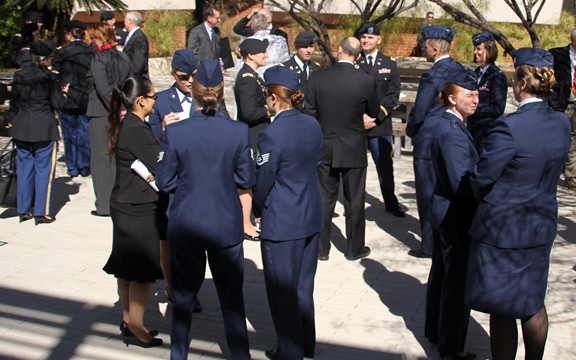The United States Court of Appeals for the Armed Forces made its first-ever appearance in Tucson on Tuesday as part of the Project Outreach program.
Project Outreach is a national program that chooses certain cases to be argued on college campuses and allows law students to participate in the official proceedings of the case by delivering an argument for the side of their choice, called an amicus brief, before the court.
The court consists of five judges and has jurisdiction over all members of the armed forces on active duty and any person subject to the Uniform Code of Military Justice. The court met at the James E. Rogers College of Law to hear the argument of United States v. Staff Sgt. Bruce L. Kelly.
“I’m actually interested in getting a job with the Air Force JAG [Judge Advocate General] Corps, so I wanted to come watch and see the military court,” said Kevin Zinke, a third-year UA law student. “I just wanted to see how the attorneys interacted with the judges and observe.”
The appellate court examined the ruling of Kelly’s court-martial conviction for possession of child pornography.
The appellant’s counsel argued that the military abused its discretion when it failed to suppress evidence of child pornography discovered on Kelly’s computer during an unreasonable search to find contraband. The search was conducted after Kelly was wounded in Iraq and evacuated back to the U.S., as stated in the final case brief.
Kelly’s counsel also argued that the army court erred when it created a new exception to the Fourth Amendment that allowed the government to search his personal computer on the basis that the government was not “certain” or “absolutely clear” that it would be returned to the wounded appellant, also stated in the final case brief.
In addition to hearing both the appellant and the government’s arguments, third-year UA law student Michelle Behan, aided by fellow students David Potts and Matthew Randall and supervised by law professor Paul Bennett, was selected to deliver an amicus argument to the court.
Behan sided with the appellant, Kelly, arguing that the military court exceeded its power in allowing an unreasonable search of private property.
After the official court proceedings were finished, the judges stayed in the room to answer any questions from the audience not pertaining to the case. The room became relaxed, with many of the judges cracking jokes and showing the lighter side of their job.
At one point during the question and answer session, Judge Margaret A. Ryan turned the tables by complimenting Behan on her argument and asking her to share with the audience the process she used to create it.
“I consider it one of the greatest honors since being a student,” Behan said, about the opportunity to present to the court.









